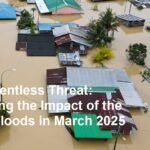Singapore’s Prime Minister, Lawrence Wong, issued a stark warning on Tuesday, urging his country to prepare for more economic turbulence following the recent implementation of reciprocal tariffs by the United States government. In a detailed address to a gathering of senior government officials and economic experts, Wong outlined the challenges that lie ahead and stressed the need for strategic planning and swift policy adjustments.
During his speech, PM Wong highlighted that while Singapore has long been known for its resilient and forward-thinking economic policies, the current global trade environment demands even greater vigilance. “We are navigating through uncertain waters,” Wong stated. “The new U.S. tariffs signal that the global economic order is shifting, and we must be ready to adapt to additional shocks that may follow.” His remarks come on the heels of the U.S. decision to impose reciprocal tariffs on several of its major trading partners, a move that has rattled global markets and disrupted established supply chains.
Wong explained that Singapore, as a small and open economy, is particularly sensitive to external shocks. The nation’s economic prosperity has been built on robust trade relations and a deep integration with global markets. Any significant alteration in these dynamics, such as the imposition of tariffs by a major economy like the United States, could have cascading effects on Singapore’s export-driven sectors. “Our economy is highly intertwined with global trade networks,” he noted. “Disruptions in these networks can lead to volatility in sectors ranging from manufacturing to finance.”
The reciprocal tariffs, which were implemented in response to a series of trade disputes, have been perceived as a defensive move by the U.S. to protect its domestic industries. However, they have also sparked concerns among other nations about the potential for a broader trade war that could impact global growth. As a leading financial hub and one of the world’s busiest ports, Singapore stands at the crossroads of these developments. Wong acknowledged that while the government is confident in its ability to manage such shocks, additional measures may be necessary to safeguard the nation’s economic interests.
In response to these challenges, the Singaporean government is set to intensify its monitoring of global economic trends and bolster support for affected industries. Wong indicated that several initiatives are already underway, including efforts to diversify trade partnerships, enhance digital infrastructure, and promote innovation in key sectors. “We must not only react to current disruptions but also build a more resilient economic framework for the future,” he emphasized. This proactive approach is expected to cushion the impact of external shocks and ensure that Singapore remains competitive in an increasingly unpredictable global marketplace.
Analysts have long noted that Singapore’s economic model is highly adaptive, with a proven track record of weathering external challenges through strategic foresight and robust policy frameworks. Nonetheless, the current situation underscores the risks associated with relying too heavily on global supply chains that are vulnerable to political and economic shifts. By preparing for further shocks, Singapore aims to minimize potential negative repercussions on employment, investment, and overall economic stability.
In addition to domestic policy adjustments, PM Wong stressed the importance of international cooperation. He called on regional partners and international organizations to work collaboratively in addressing the root causes of these trade tensions. “Global challenges require global solutions,” Wong remarked. “We need a collective response to maintain stability and foster an environment of mutual benefit rather than confrontation.” His comments resonated with many in attendance, reflecting a shared sentiment among regional leaders that coordinated efforts are essential to counter the disruptive effects of protectionist policies.
In summary, PM Lawrence Wong’s address underscores a clear message: Singapore must brace for further economic shocks in light of the U.S. reciprocal tariffs. The government’s response, centered on resilience, strategic diversification, and international cooperation, seeks to navigate these turbulent times while safeguarding the nation’s long-term economic interests. As the global trade landscape continues to evolve, Singapore’s proactive measures are expected to play a critical role in maintaining stability and promoting sustained growth for its economy.












